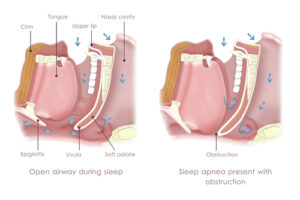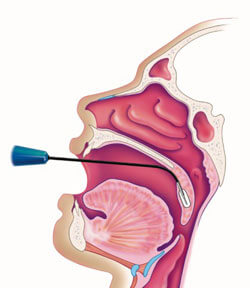Posted by: Maryland ENT in General
Do you wake up feeling exhausted? Are you constantly complaining that you feel tired during the day?
Does your partner often complain that you snore so loudly that they can’t fall asleep? Beyond being annoying and frustrating, these are signs of sleep apnea.
If you have sleep apnea, this is a condition that requires treatment and shouldn’t be ignored. Without treatment, sleep apnea can cause serious complications.
Keep reading to learn more about sleep apnea, the risks of untreated sleep apnea, how to treat it, and why it’s worth treating.
What is Sleep Apnea?

Sleep apnea is a serious sleep disorder. The sleep disorder occurs when you stop breathing for short periods while sleeping.
The pauses in breathing can last for 10 to 30 seconds at a time. You may experience lapses in breathing that occur hundreds of times each night.
Insufficient oxygen will wake you up during a sleep apnea episode, so you start breathing again. But for many patients with sleep apnea, you won’t realize you’ve woken up.
Types of Sleep Apnea
The three main types of sleep apnea are:
Obstructive Sleep Apnea:
Obstructive sleep apnea (OSA) is the most common form of the condition that people are diagnosed with. OSA occurs when you can’t get enough air because of a partial, temporary, or total blockage in your airway.
Patients with obstructive sleep apnea only begin breathing as they should once they start gasping loudly, or their body jerks them awake.
Central Sleep Apnea:
In patients with central sleep apnea (CSA), the brain doesn’t send the proper signals to your muscles to ensure you start breathing. CSA differs from obstructive sleep apnea because breathing doesn’t stop because of upper airway obstruction.
Mixed Sleep Apnea:
Mixed sleep apnea occurs when a patient has both obstructive sleep apnea and central sleep apnea at the same time.
Signs of Sleep Apnea
The three types of sleep apnea share similar symptoms. They include:

- Loud snoring
- Daytime sleepiness
- Night sweats
- Excessive tiredness
- Morning headaches
- Trouble concentrating
- Unrefreshed sleep
- Poor memory
- Irritability or moodiness
- Sore throat or dry mouth in the morning
- Frequently waking up at night to use the bathroom
- Low libido
- Anxiety or depression
Causes of Sleep Apnea
There are various causes of sleep apnea, including:

- Obesity
- Premature birth
- Large tonsils
- Nasal congestion
- Endocrine disorders
- Genetics
- Menopause
- Sedatives
- High altitude
- Neuromuscular disorders
- Structural abnormalities of parts of the respiratory tract, including throat and nose
Other risk factors that make you more likely to develop sleep apnea are:

- Being male
- Older age
- Family history of sleep apnea
- Long-term use of opioid medications
- A large neck circumference
- Sleeping on your back
- Unhealthy lifestyle habits – drinking alcohol excessively, smoking, sedentary lifestyle, unhealthy diet
- Medical conditions like Parkinson’s disease, previous stroke, and PCOS
Dangers of Untreated Apnea
If it’s left untreated, sleep apnea can affect the following systems in your body:
Respiratory system
Having sleep apnea can exacerbate chronic obstructive pulmonary disease and asthma symptoms.
Digestive system
Uncontrolled sleep apnea worsens GERD symptoms and increases your risk of developing fatty liver disease.
Endocrine system
Having sleep apnea increases your risk of developing type 2 diabetes.
Cardiovascular system
Sleep apnea affects the cardiovascular system. Patients with the condition become more likely to develop heart disease, high blood pressure, and stroke.
Sleep apnea can also lead to:
Relationship problems

If you have sleep apnea, you may become moody, withdrawn, and depressed. These mood changes can put an increased strain on your relationship.
Decreased safety
People with sleep apnea have higher chances of being involved in work-related accidents and car accidents than those without sleep apnea and can sleep restfully through the night.
Sleep Apnea Treatment
There are many treatments available for sleep apnea, depending on the cause and severity of your condition. Some of the options include:
Lifestyle changes

Your ENT specialist at Maryland ENT may recommend the following lifestyle modifications to manage your sleep apnea:
- Lose weight
- Maintain a healthy diet
- Exercise more
- Quit smoking if you’re a smoker
- Reduce alcohol use
- Sleep on your side
- Avoid certain medications like opioids, muscle relaxers, high-dose benzodiazepines, and atypical antipsychotics
Decongestants and Nasal Sprays
Managing your allergies using a nasal spray or decongestant can help if you have mild sleep apnea.
Oral Appliances
Oral appliances are effective treatment options for patients with mild to moderate sleep apnea symptoms. Patients wear customized oral appliances while sleeping to ensure their airways remain open while sleeping.
Surgical Intervention
If other treatments don’t improve your sleep apnea, your ENT specialist may recommend surgery. The different types of procedures available are quite effective if you have abnormal tissues like a deviated septum, a tiny lower jaw with an overbite, or enlarged tonsils.
Palate Coblation

Palate coblation is a minimally invasive surgery to treat sleep apnea. Coblation uses radiofrequency energy to tighten soft palate tissue.
Stiffening tissues of the soft palate decreases the symptoms of snoring and sleep apnea.
Benefits of Sleep Apnea Treatment
Sleep apnea treatment can offer a variety of benefits, including:

Improved Sleep Quality
Sleep apnea means you stop breathing while sleeping multiple times per hour. Your body is forced to wake a little with every pause to ensure you resume breathing.
These interruptions can prevent you from getting enough deep sleep to wake up refreshed the following day. Sleep apnea treatment helps you breathe easily throughout the night, giving you restful sleep and more energy the next day.
Reduces the Risk of Health Conditions
Treating sleep apnea lessens your chances of developing medical conditions associated with sleep apnea, like stroke, type 2 diabetes, fatty liver disease, heart disease, and high blood pressure.
Diminishes Your Risk for Cancer
The correct treatment for sleep apnea makes you less likely to develop certain cancers like breast, colorectal, lung, and prostate cancers.
Better Diabetes Management
Treating sleep apnea results in improved control of your blood sugar.
Lowers Your Chances of Getting Depression
A decrease in sleep disturbances reduces your risk of depression and other mood changes.
Improved Relationship
Treatment of sleep apnea helps you and your partner sleep better. A restful night also keeps you in a good mood which can help reduce feelings of contention.
Get the Help You Need for Sleep Apnea

Sleep apnea can wreak havoc in your everyday life. But you don’t have to continue suffering from the sleep disorder.
At Maryland ENT, our trusted team can accurately diagnose sleep apnea and provide an effective treatment plan to help you sleep better each night.
Are you ready to get to the bottom of the cause of your sleepless nights? Improve your quality of life by scheduling an appointment at Maryland ENT in Baltimore and Lutherville, MD, now!



